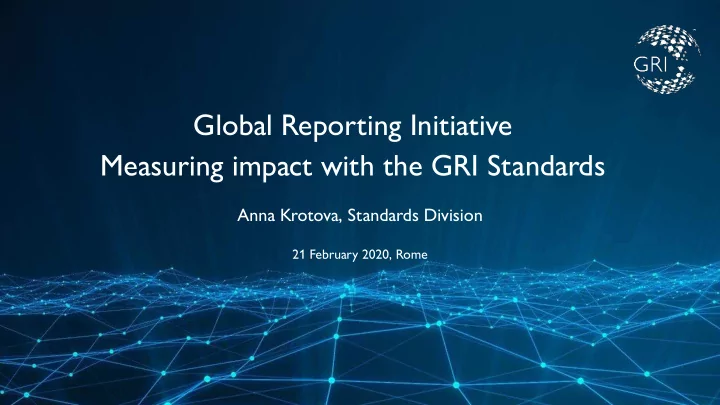

Global Reporting Initiative Measuring impact with the GRI Standards Anna Krotova, Standards Division 21 February 2020, Rome
Our impact 62 145 policies in countries reference the GRI Standards 75% Of the largest 250 companies in the world use the GRI Standards 63% Of the FT Europe 500 companies Training partners across 67 100 + countries offer GRI Certified Training Courses (33,000 + participants trained) 51,322: Reports registered in the GRI Sustainability Disclosure Database
GRI and the reporting landscape Provide an Make decisions What and how Synthesize Disclose the Help collect or opinion about based on to report the data data verify the data the data the data Standards and Consulting and Data Analysts and Data Report Issuers Frameworks Assurance Aggregators Ratings Consumers Sustainability Financial Companies Civil Society • ‘The Big 4’ • information information Cities Labor Unions • • Company • Management Governments • Investors • … •
Development of the GRI Standards The GRI Standards are developed and delivered in a way that ensures: Multi-stakeholder input: Full transparency: Balance of constituency and regional All GSSB standard-setting representation, public consultations, meetings and materials are and in-depth workshops worldwide open to the public Learn more: globalreporting.org/standards
Topic-specific Standards GRI 200: Economic GRI 400: Social 201: Economic Performance 401: Employment 202: Market Presence 402: Labor/Management Relations 203: Indirect Economic Impacts 403: Occupational Health and Safety 204: Procurement Practices 404: Training and Education 205: Anti-corruption 405: Diversity and Equal Opportunity 206: Anti-competitive Behavior 406: Non-discrimination 207: Tax 407: Freedom of Association and Collective Bargaining 408: Child Labor 409: Forced or Compulsory Labor 410: Security Practices GRI 300: Environmental 411: Rights of Indigenous Peoples 301: Materials 412: Human Rights Assessment 302: Energy 413: Local Communities 303: Water and Effluents 414: Supplier Social Assessment 304: Biodiversity 415: Public Policy 305: Emissions 416: Customer Health Safety 306: Waste 417: Marketing and Labeling 307: Environmental Compliance 418: Customer Privacy 308: Supplier Environmental Assessment 419: Socioeconomic Compliance
The GRI 300 series standards (environmental) • GRI 301: Materials The GRI Standards are a set of interrelated • GRI 302: Energy reporting standards, enabling organizations to • GRI 303: Water and report publicly on their impact outward on the Effluents economy, environment and society. • GRI 304: Biodiversity The standards in the 300 series request • GRI 305: Emissions information about an organization’s impacts on • GRI 306: Waste (under review) living and non-living natural systems, including • GRI 307: Environmental Compliance land, air, water and ecosystems. • GRI 308: Supplier Environmental Assessment
GRI 304: Biodiversity Standard Disclosures Indicators Operational activities that may have an Protected areas, areas of high biodiversity value outside protected • impact on biodiversity areas affected IUCN Red List species and national conservation list species affected • by level of risk The nature of impact of activities, Nature of impact: Significance of impact: products and services, and the Pollution • Extent of areas impacted • significance of impact Introduction of invasive species, • Duration of impact • pests and pathogens Reversibility or irreversibility • Reduction of species • of impact Habitat conversion • Changes in ecological processes • outside the natural range of variation The extent of an organization’s • Habitat areas protected and restored (size, location, condition at the prevention and remediation activities end of the close of the reporting period) with respect to the impact
Expected Standard review timeline Q2 2020: GSSB forms the project working group (PWG) of experts 1 April – September: PWG develops draft Standard 2 à June, first peer consultation at the IUCN World Conservation Congress, Marseille à June, second peer consultation at the GRI’s Reporters Summit, Washington DC September – November: public consultation 3 à September, UNGA Biodiversity Forum, New York à October, COP-15, Kunming à November, COP-26, Glasgow December – May 2021: finalization of the draft Standard by the PWG 4 5 June 2021: Standard release
Thank you for your kind attention. krotova@globalreporting.org
Recommend
More recommend